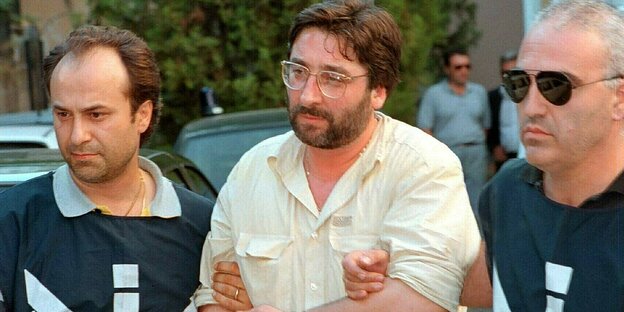Francesco Schiavone has been in a maximum security prison since 1998 for numerous murders. Now the famous Camorra boss wants to cooperate with the judicial system.

Will you unpack? Francesco Schiavone during his arrest in 1998 Photo: Franco Castaño/ap
ROME taz | Everyone has always called Francesco Schiavone “Sandokan”, a more than friendly nickname. Sandokan is the noble hero of several novels by Emilio Salgari set in India and Malaysia, who more than 100 years ago took his Italian readers to exotic kingdoms, like Karl May at that time in Germany.
But there is nothing noble about Francesco Schiavone, head of the Camorra in the city of Casal di Principe. This man, now 70 years old, has been in a high-security prison since 1998 and has been sentenced to 14 “life sentences” for numerous murders. Until now, everything suggested that he would one day die in prison. As he corresponds to a boss of bosses, as did the Sicilians Totò Riina and Bernardo Provenzano.
But now Sandokan took another surprising turn in his life with his recent announcement to the prosecutor that he wanted to present himself and make himself available to the justice system as a “pentito”, a “penitent” – as key witnesses are called in Italy.
Schiavone would have a lot to say. When he was only 18 years old, he went to prison for the first time for illegal weapons possession. He left quickly. And he quickly took off in his criminal career, working his way up to become one of the bosses leading the “Casaslesi clan.” The clan owes its name to his hometown, Casal di Principe, a town of 20,000 inhabitants in Campania, 30 kilometers north of Naples. No matter how small the place of origin, the wheel that Sandokan and three other chiefs turned atop “Casalesi” was just as big. Sandokan was well connected, not only in the region: he belonged not only to the Camorra, but also to the Sicilian Cosa Nostra.
“Gomorrah” author Saviano is skeptical
He was active in the usual commercial areas, drug trafficking, violently imposed monopolies in the supply of local supermarkets or the cement business for construction sites in the area. However, Schiavone and company achieved a leadership position with devastating consequences for the surroundings of Casal di Principe in another business: the illegal “disposal” of toxic waste of all kinds, waste that was simply buried in the ground and contaminated the area. and the poisoned people.
Schiavone could now unpack. Tell where millions and millions have gone, the accumulated “Treasure of the Casalesi.” He could also report on the honorable and completely legal businessmen who did business with the Camorra, as well as the politicians who provided them protection.
But Roberto Saviano, author of the book “Gomorrah” by Casal di Principe, has doubts about whether Sandokan will really come clean. Saviano himself has been under police protection since 2006 because he insulted Schiavone and his cronies as cowards not only in his texts, but also in public appearances in his hometown. Now he and many others fear that Schiavone will put “a little change” on the table to get prison relief, but that he will continue to keep the big secrets and the great riches.
It will soon become clear whether Saviano's skepticism is justified. The law gives Schiavone a maximum of six months to completely unpack. The prosecution will then decide whether his repentance is genuine and whether he can benefit from prison reparation and, later, even his release.